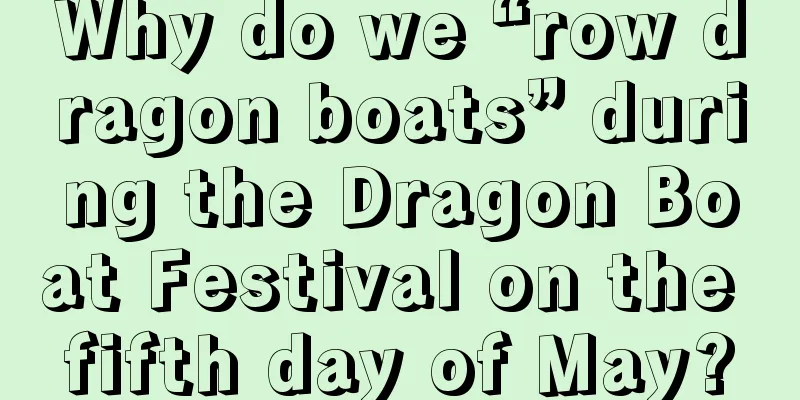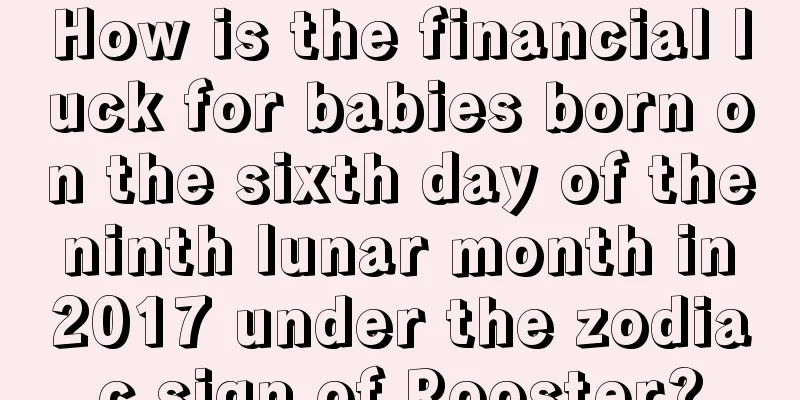Why do we “row dragon boats” during the Dragon Boat Festival on the fifth day of May?

Since we were young, we have known that we have to "eat rice dumplings and row dragon boats" on the Dragon Boat Festival. We know that eating rice dumplings is inseparable from Qu Yuan. So why do we "row dragon boats" on the Dragon Boat Festival on the fifth day of May? On the fifth day of the fifth month of the lunar calendar, we usher in the new year’s Dragon Boat Festival amidst the aroma of rice dumplings. Let’s follow the Fortune Teller website to take a look at the information about the Dragon Boat Festival in 2018!Why do we “row dragon boats” during the Dragon Boat Festival on the fifth day of May?Dragon boat racing is the main custom of the Dragon Boat Festival. According to legend, it originated from the ancient Chu people who were reluctant to see the virtuous minister Qu Yuan commit suicide by jumping into the river, so many people rowed boats to chase him and save him. They rushed after him, but when they reached Dongting Lake, he disappeared. Since then, dragon boat races have been held every year on May 5th to commemorate this event. Dragon boat racing is used to drive away the fish in the river to prevent them from eating Qu Yuan's body. The custom of racing boats was popular in Wu, Yue and Chu.In fact, "Dragon Boat Racing" has existed as early as the Warring States Period. Rowing canoes carved into the shape of dragons to the sound of rapid drums and racing to entertain the gods and the people is a semi-religious, semi-entertaining program in the ritual. Later, in addition to commemorating Qu Yuan, people in different places also gave different meanings to dragon boat racing. Before the dragon boat race, one must first invite the dragon and offer sacrifices to the gods. For example, the Guangdong dragon boats are pulled out of the water before the Dragon Boat Festival. After offering sacrifices to the God of the South China Sea in the South China Sea Temple, the dragon head and tail are installed before preparing for the race. They also buy a pair of paper roosters and place them on the dragon boat, believing that they can protect the boat from harm (which vaguely corresponds to the ancient bird boat). People in Fujian and Taiwan go to Mazu temples to worship. Some people offer sacrifices to the dragon head directly by the river, killing chickens and dripping their blood on the dragon head, such as in some areas of Sichuan, Guizhou and so on. In Miluo County, Hunan Province, people must first go to the Quzi Temple to worship the dragon head, put a red cloth on the dragon head, and then place the dragon head on the boat for the race. This is to worship the dragon god and commemorate Qu Yuan. In Zigui, Qu Yuan's hometown in Hubei, there are also rituals to worship Qu Yuan. The custom of offering sacrifices to Qu Yuan is recorded in the Book of Sui, Geography: "The oars are rowing at full speed, the oarsmen's songs are roaring, the noise is resounding on land and water, and there are crowds of spectators." Liu Yuxi of the Tang Dynasty made a note in Dragon Boat Race Song: "The dragon boat race began in Wuling, and now people raise their oars and sing in harmony, and they all shout: 'Where is he?', which means "Where is Qu Yuan?" It can be seen that in the two lakes region, offering sacrifices to Qu Yuan and dragon boat racing are closely related. It is possible that after Qu Yuan (as well as Cao E, Wu Zixu, etc.) passed away, the local people also used soul boats to send their souls back for burial, hence this custom. What is the meaning of dragon boat racing?Theory of commemorating Qu Yuan <br /> According to the "Biographies of Qu Yuan and Jia Sheng" in "Records of the Grand Historian", Qu Yuan was a minister of King Huai of Chu during the Spring and Autumn Period. His advocacy of promoting virtuous people and granting them power, enriching the country and strengthening its military, and uniting Qi to resist Qin was strongly opposed by aristocrats such as Zi Lan. Qu Yuan was dismissed from his post, driven out of the capital, and exiled to the Yuan and Xiang River basins. While in exile, he wrote immortal poems such as "Li Sao", "Heavenly Questions" and "Nine Songs", which expressed his concern for the country and the people. In 278 BC, the Qin army conquered the capital of the Chu State. Qu Yuan could not bear to abandon his homeland, so on the fifth day of the fifth month, after writing his last work "Huaisha", he hugged a stone and jumped into the Miluo River and died.The story of Panhu calling back the soul in Yuanling <br /> Long before Qu Yuan, there were dragon boats in Yuanling. The Yuanling Dragon Boat Festival originated in ancient times, and the object of worship is Panhu, the common ancestor of all ethnic groups in the Wuxi region. Panhu once settled in a stone cave in Banxi, Yuanling, and gave birth to six sons and six daughters. His sons and daughters married each other and multiplied into six ethnic groups: Miao, Yao, Dong, Tu, She, and Li. After Panhu died, the six tribes held a banquet to invite the gods and call back his soul. Because Yuanling is mountainous and water-dense, the wizard had no idea where his soul had gone, so he asked each tribe to build a dragon boat, and search and call out along the streams and rivers, which later evolved into the ritual of rowing boats to summon souls. The Yuanling dragon boat race originated 5,000 years ago, more than 3,000 years earlier than the idea of commemorating Qu Yuan. In Memory of the Dragon God <br /> Legend has it that a long time ago, there was no river on the west bank, only a small, dirty ditch. One day, a fisherman caught a small snake in a ditch. This little snake is very strange, with nine shining scales on its tail. When the fisherman touched the scales, the snake's eyes flashed with pleading light, looking very pitiful. The fisherman suddenly felt compassion for the fish, stroked its scales, and put it back into the ditch. Unexpectedly, the nine scales suddenly fell off, and the little snake grew up and danced, turning into a little dragon. It turned out that it was a divine dragon from heaven. It violated the heavenly rules and was punished by the Jade Emperor, so it became like this. There are nine locks on its tail - the same as the nine shining scales on the little snake's tail. The Jade Emperor once said: "This lock can only be opened with the help of human yang energy." Just now, the fisherman accidentally opened the thousand-year-old shackles on the little dragon. To thank the fisherman, the little dragon kept rolling in the ditch and sprayed water from its mouth into the small ditch. Gradually, the small ditch turned into a big river (the West Bank River), and the river water brought a good harvest to the West Bank. To commemorate this divine dragon, people named the villages along the river Longtou Village, Shanglongshou Village, etc. On the day when the dragon ascends to heaven, which is the Dragon Boat Festival, dragon boat races are held to celebrate. |
Recommend
Do men born in the sixth month of the lunar calendar have good fortune? Boy's fate analysis
There are a lot of people born every day, and the ...
Is it suitable to travel on the seventh day of the leap fourth month in 2020? Is it Yang Gong's death anniversary?
Query and analyze auspicious and inauspicious days...
Is May 24th of the lunar calendar 2021 a good day? Can we get married?
There are certain considerations and rules when ch...
Is July 11th of the lunar calendar in 2020 an auspicious day? The hexagram of the day is displayed!
The term "auspicious day" appears very f...
What are the do's and don'ts on the 30th day of the eighth lunar month in 2019?
Today is a good day to check the do's and don...
Can I have a haircut on April 19th of the lunar calendar in 2022? Is it an auspicious day for a haircut?
The quality of a haircut varies depending on the t...
A list of things to do and not to do on April 14th of the lunar calendar in 2020
An overview of the do’s and don’ts on April 14th ...
What are the do’s and don’ts on December 15th of 2021? Can we start work?
The twelfth month of the lunar calendar is already...
Is April 15th of the lunar calendar in 2017 a good day for marriage?
Introduction: Marriage is a big event for couples,...
What are the appropriate and taboo things to do on the 25th day of the 12th lunar month in 2019?
What are the appropriate and taboo things to do o...
Is it okay to visit the graves and worship ancestors on the 20th day of the seventh lunar month in 2019? What should we pay attention to during the worship?
Introduction: Sacrifice is one of the important fo...
Is April 25th of the lunar calendar in 2022 a suitable time to install a gate? What color is good for the front door?
The fourth month of the lunar calendar is also kno...
What is the date like on September 21st of the lunar calendar in 2021? Is it suitable for marriage?
In September, chrysanthemums bloom proudly in the ...
What will the weather be like during the Dragon Boat Festival in 2021? Will it be hot?
The Dragon Boat Festival is the day when dragons f...
Is it good or bad for children born during the Chinese New Year?
Although everyone cannot choose the time of birth,...









